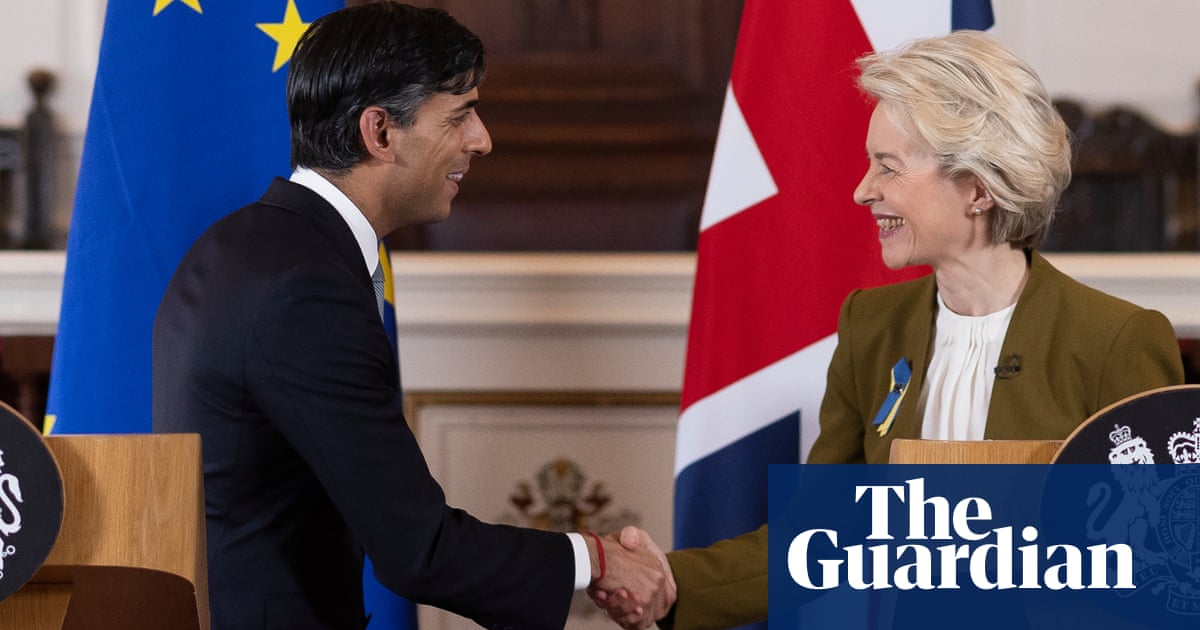
The Great British public was last week treated to a double bill of unfolding drama, one of which ended abruptly and in horror and the other in a joyful result that lifted the spirit of the nation, at least in the English part of the union.
As testimony to the growing popularity of women’s football, the European Championships semi-final between England and Sweden was scheduled for prime-time broadcast on terrestrial television. Meanwhile, another in the long series of bruising debates between the two Tory candidates aspiring to replace Boris Johnson as the leader of the Conservative Party and, with it, the coveted prize of becoming the next UK prime minister, was fittingly broadcast earlier the same evening as a mere warmup act.
As it happens, while the English Lionesses won their game comfortably, playing with flair, conviction and integrity (they even went on to win the trophy, beating Germany in Sunday’s final), those traits have been conspicuously absent from much of the cumbersome process of selecting the next Tory leader. And the debate between the two remaining candidates was cut short when presenter Kate McCann fainted in the middle of the proceedings, to the horror of the pretenders to power, Liz Truss and Rishi Sunak.
McCann has thankfully recovered from her ordeal and she resumed her duties the very next day, but it will take the British public longer to recover from Johnson’s chaotic and damaging premiership, along with the exceptionally vicious leadership contest to replace him, in which the contenders for his position have displayed obvious contempt for one another. Johnson leaves office with more than 70 percent of the electorate believing that he has performed badly — a massive fall from grace for someone who, less than three years ago, led his party to one of its greatest election victories. He also leaves the Conservative Party more divided than it has been for a very long time and ideologically directionless.
A closer look at the big majority the Conservatives won in the 2019 general election reveals that it can be attributed as much to a rejection of Labour under Jeremy Corbyn than any wholehearted endorsement of the Conservatives and their leader. And, lo and behold, Johnson’s time in Downing Street exposed most painfully the massive gap between what it can take to win an election and what it takes to perform well at the helm. At the end of the day, it was Johnson’s deeply flawed personality and lack of coherent outlook and values that ended his political career.
In the 12 years that the Tories have been in government, none of their three successive prime ministers have left office at a time of their own choosing. This is no coincidence, but is rather a reflection of the party’s profound ideological differences, as well as its ruthlessness. It was David Cameron’s colossal lapse of judgment in calling the Brexit referendum that led to his resignation as soon as the result was announced. His successor Theresa May stood no chance of uniting the party around a Brexit deal she agreed with Brussels and tried to resolve this by calling a snap general election, in which the Tories lost their parliamentary majority and almost their grip on power.
And Johnson, who tirelessly conspired to oust May and who ended up signing an even worse Brexit deal for the UK, now leaves office in humiliation, having created a mess for others to resolve — and not only on the Brexit issue. Whoever succeeds him will be selected by the Conservative Party membership only and will face the monumental task of simultaneously healing the nation and their own party, while tackling the hardest of challenges to find the Conservatives a unifying social, political and economic platform fit for the 21st century.
While the Conservative Party is absorbed with its own disagreements and factionalism, the country is facing severe challenges, some of which it shares with the rest of the world, such as the COVID-19 pandemic, the impact of the war in Ukraine and, above all, climate change. However, in the UK’s case, all these hardships are exacerbated by the specific conditions that the country faces in the post-Brexit era, which have exposed the fragility of the union itself and the society at large.
To these questions, British conservatism has no answer, mainly because it has, for too long, been obsessed with the populistic fantasy of “reclaiming sovereignty” or “controlling our borders,” instead of developing an approach that has a British flavor but is tolerant and global in its outlook. The party’s obsession with Europe has divided it for years along diametrically opposed lines, between those characterized as “little Englanders” and those who subscribe to a more neoliberal and globalist approach that is Europhile and recognizes the economic, political and cultural opportunities in closer ties with the world. Even if the latter are no great fans of liberal immigration policies, they appreciate their value.
Whoever takes the helm come Sept. 5, when the result of the leadership contest is announced, will find, just like their predecessors, that it is almost impossible to reconcile these two contradictory paradigms and to avoid remaining a party that is in power but has no ability to govern.
Furthermore, because conservatism has not come to grips with the notion of a modern welfare society, there is tension between accepting it, and for some even supporting it, and how it is paid for. The Tories’ instinct has always been for an economy of low taxation and small government, whereas a high standard of public services demands levels of taxation that inevitably contradict this.
At times of economic growth, when the government’s coffers are overflowing, it is easier to maintain lower taxes while keeping one-nation conservatives satisfied. However, the current economic conditions of slow growth, high inflation and record levels of taxation mean that the Conservatives are way out of their comfort zone and out of step with the very voters who gave them their surprise landslide victory in the last election.
Johnson leaves the Conservative Party more divided than it has been for a very long time and ideologically directionless.
Yossi Mekelberg
The UK’s fate, probably for the next two years, will now be decided by no more than 160,000 members of the Conservative Party, while the rest of us are mere spectators. Furthermore, there is a real possibility that, by the next time the entire electorate is asked to cast its vote, Scotland will no longer be part of the union. Meanwhile, the Good Friday Agreement remains under severe threat, relations with Europe are becoming increasingly tense, the UK economy is experiencing the slowest growth of the G7 countries and the cost of living is rocketing; not to mention that many communities across the country are on the verge of collapse and food banks are in greater demand than ever before. The question is, can a Conservative prime minister respond to all these challenges — problems that have, to a large extent, been created by their own party — without a radical reform of their worldview?
Yossi Mekelberg is professor of international relations and an associate fellow of the MENA Program at Chatham House. He is a regular contributor to the international written and electronic media. Twitter: @YMekelberg












